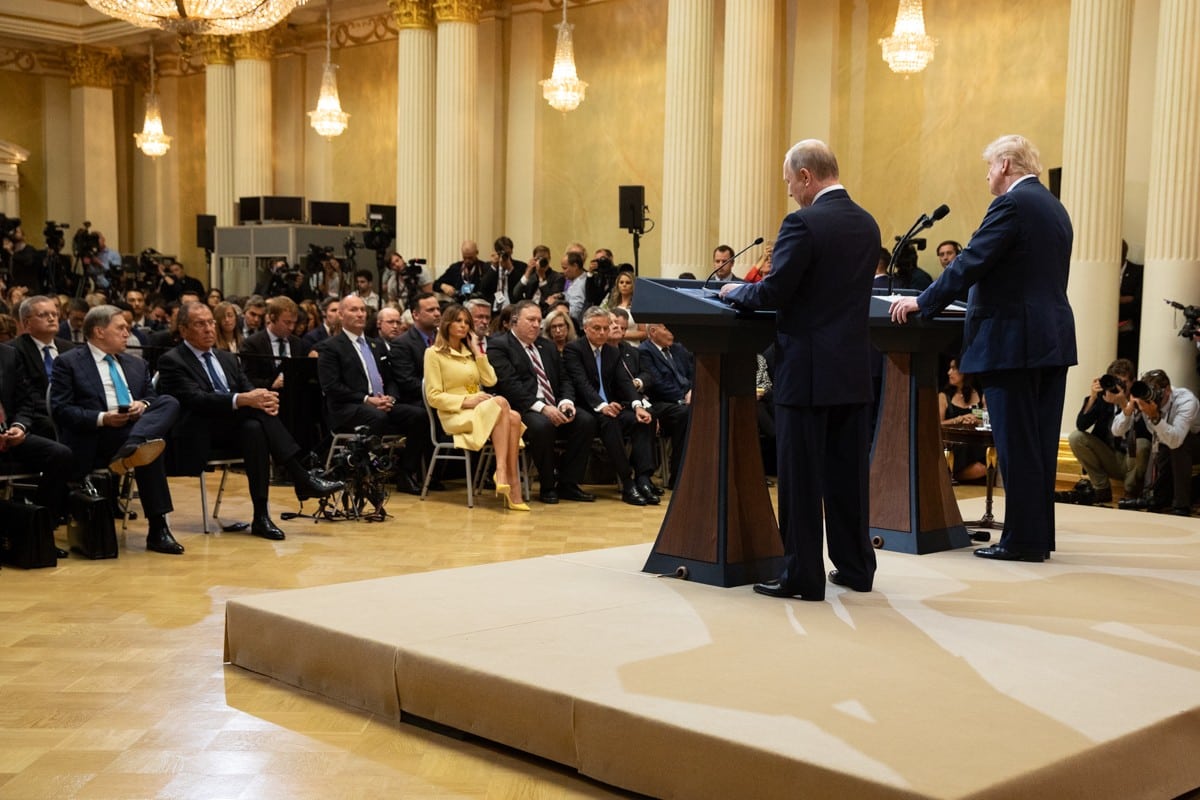 Image courtesy of The White House on Flickr
Image courtesy of The White House on Flickr
To Helsinki and Back: Implications for U.S. National Security
On Monday, July 16th US President Donald Trump met with Russian President Vladimir Putin in Helsinki. The intent of this summit was to discuss strategic nuclear stability, the fight against international terrorism, regional issues like the conflicts in Ukraine and Syria, and US-Russia ties. The day started about four hours prior to the meeting with President Trump tweeting, “Our relationship with Russia has NEVER been worse thanks to many years of US foolishness and stupidity and now, the Rigged Witch Hunt!” To this, Russia’s Ministry of Foreign Affairs tweeted back saying, “We agree.” When asked about the strained US-Russia relationship at the press conference following the historic meeting, Trump said, “We have both made some mistakes.”
Another talking point at the press conference was Robert Mueller’s recent indictment of twelve Russian spies who are accused of meddling in the 2016 US presidential election. When asked about whether Russia meddled in the election, President Trump publicly challenged the conclusions of US intelligence agencies, stating, “I don’t see any reason why it would be [Russia]. President Putin was extremely strong and powerful in his denial today.” Additionally, Putin put forth an idea for a response to the indictment, promising that Russian law enforcement would agree to interrogate the twelve accused Russians if, in exchange, the US agreed to interrogate American intelligence officials whom the Kremlin has accused of committing crimes against Russia. In both instances, Russian and US officials would be present in the room. At the time Trump neither agreed nor disagreed with this proposal, calling it an “incredible offer.” He has since publicly rejected the idea, with Press Secretary Sarah Huckabee Sanders saying in a statement, “It is a proposal that was made in sincerity by President Putin, but President trump disagrees with it.”
Lastly, President Trump claims to have elicited a promise from Putin to help negotiate North Korean denuclearization. Russia’s RIA news agency reported that a summit between the leaders of Russia and North Korea is “on the agenda.” When asked about whether sanctions should be loosened, Russian UN Ambassador Vassily Nebenzia said, “We should think about steps in that direction because inevitably there is progress on the track that should be reciprocal, that should be a two-way street. The other side should see encouragement to go forward.”
The events of the summit in Helsinki could have major effects on US national security. Blaming the strained US-Russia relationship on the “foolishness” and “stupidity” of the US and its former leadership completely ignores all of Russia’s inexcusable actions, including its annexation of Crimea, support of the Assad regime in Syria, meddling in foreign elections, and alleged poisoning of a former British spy. Trump’s remarks are causing great damage to the international reputation of the US, while giving Putin the opportunity to bolster Russia’s reputation worldwide. The US’ relationships with many of its allies and other key countries are at risk, while the door has been left open for Russia to forge new friendships.
To continue, working on a solely bilateral basis with Russia on North Korean denuclearization is a very dangerous game to play. American allies, like Japan and South Korea, should be involved in any consultations with Russia regarding North Korea. Russia has repeatedly pushed for the lifting of sanctions, which is not yet in the interest of the US. Encouraging a stronger relationship between Russia and North Korea could also weaken the leverage the US exerts over North Korea.
It is not an inherently bad idea to strive for greater communication and peace with Russia, but the president must firstly look out for American interests and listen to the advice of our intelligence agencies. Going forward, it is imperative that the US does not ignore or delegitimize Russia’s numerous deplorable actions in its efforts to “strike a deal.” President Putin is not interested in making deals, but weakening the US and its allies, no matter what it takes to get there.





